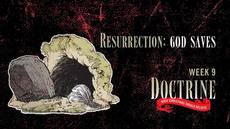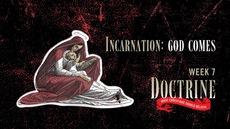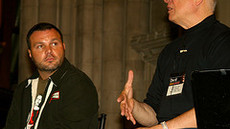D. Martyn Lloyd-Jones once wrote: "Prayer is beyond any question the highest activity of the human soul. Man is at his greatest and highest when, upon his knees, he comes face to face with God" (Studies in the Sermon on the Mount, [Grand Rapids, MI: Wm. B. Eerdmans Publishing Co., 1979], 45). This week in my sermon we examined the Lord’s Prayer, where Jesus himself taught us how to pray:
And when you pray, you must not be like the hypocrites. For they love to stand and pray in the synagogues and at the street corners, that they may be seen by others. Truly, I say to you, they have received their reward. But when you pray, go into your room and shut the door and pray to your Father who is in secret. And your Father who sees in secret will reward you.
And when you pray, do not heap up empty phrases as the Gentiles do, for they think that they will be heard for their many words. Do not be like them, for your Father knows what you need before you ask him.
Pray then like this: Our Father in heaven, hallowed be your name. Your kingdom come, your will be done, on earth as it is in heaven. Give us this day our daily bread, and forgive us our debts, as we also have forgiven our debtors. And lead us not into temptation, but deliver us from evil.
For if you forgive others their trespasses, your heavenly Father will also forgive you, but if you do not forgive others their trespasses, neither will your Father forgive your trespasses. (Matt. 6:5–15)
Jesus prefaces his teaching on how we should pray by first telling us how we should not pray. While it may seem mean to some people, Jesus was pointedly clear that we should not look to religious people for lessons on prayer. Indeed, while some religions and religious people may seem very pious and serious in their praying, they are in fact praying for the benefit of an audience or a demon. Jesus is emphatic that religious prayer is repugnant to God. This is because religious prayer is performance for the approval of a human audience; it is heaping up empty phrases and big words into lengthy prayers as if God needs to be informed or compelled.
Conversely, Christian prayer is to be humble, simple, respectful, sincere, and relational. Furthermore, prayer includes both speaking to God and listening to God. By teaching us to pray, Jesus was clear that he was not teaching us what to pray, as if his words were to be repeated over and over like a pagan mantra. Rather, his prayer is a model of prayer that, by the power of the indwelling Holy Spirit, we can learn from as our own prayer life matures.
We will now examine how the Lord’s Prayer moves from a focus on God to our needs and includes six types of prayer in this one prayer.
The Lord’s Prayer, Part 1 – God
1. Adoration
Our Father in heaven . . .
Jesus starts with the address, "Our Father in heaven" (v. 9; also see Luke 11:1–4, where the prayer simply begins with "Father"). "Our" links the praying person to other believers; while the prayer may be used in private, it is meant to be prayed in community, which means that it may have had a liturgical use from the beginning (though this, of course, does not mean that it cannot be profitably used in private prayer).
Jesus addressed God simply as "Father" (11:25; Mark 14:36; Luke 23:46; John 17:1), and taught his followers to do the same. When God is called "Father" in the Synoptic Gospels, the word is always on the lips of Jesus. This is not commonplace in ancient religion, but rather a new understanding of the nature of God Jesus taught his disciples. Addressing God as "Father" is distinctive because others, both Jews and Gentiles, even if they addressed God as "Father," tended to begin their prayers with titles stressing God’s greatness, lordship, and the like. But, while the address expresses love and devotion, the one whom we call Father is at the same time supremely great, as the fact that he is "in heaven" reminds us ("God is in heaven, and you upon earth," Eccl. 5:2). We should not miss the balance in this opening to the prayer. We address God intimately as Father, but we immediately recognize his infinite greatness with the addition of "in heaven." (see Leon Morris, The Gospel According to Matthew [Grand Rapids, MI: Wm. B. Eerdmans Publishing Co., 1992], 143–144).
Importantly, Jesus tells us that an understanding that God is Dad is primary to prayer. In my opinion, this truth is the key to prayer. If we understand that God is Dad then we will naturally speak to him anytime about anything because we know we are loved, cared for, and safe with him. This fact also explains why we do not pray with people or like people of other religions who sadly do not know God as Dad.
2. Worship
. . . hallowed be your name. Your kingdom come, your will be done, on earth as it is in heaven.
The kingdoms of light and darkness are at war in this world and one day Dad’s kingdom will completely crush and replace the kingdom of Satan. Until that day, we are to pray for Dad’s kingdom to show up on the earth in such things as love, peace, racial unity, forgiveness, and generosity for all, especially the poor and marginalized. For that to happen, we must pray for our own will to align with Dad’s. We must be kingdom servants who do not just pray for Dad to do as we ask, but more importantly pray "your will be done" and trust whatever Dad would have as his will for our lives.
The Lord’s Prayer, Part 2 – Us
3. Provision
Give us this day our daily bread . . .
Some sadly think that prayer is solely spiritual business. But, we are whole people with integrated lives and Dad is happy for us to bring to him our physical needs for such things as food. As we do, it is important that we bring to Dad our needs and not our greeds. We also need to remember that we are not notifying him of information he is unaware of but rather discussing with him our needs in faith that he cares and will provide.
Indeed, our Dad cares about the little things and by praying to him for our needs we will grow to see that everything we have is a gift from his hand to be received with thanks. Furthermore, in praying for "our" daily bread, we are identifying ourselves with other Christian brothers and sisters, who have been adopted into Dad’s family thanks to the work of our Big Brother Jesus, and who also are in great need of provision in their lives.
4. Confession
. . . and forgive us our debts . . .
Confession is one prayer that Jesus never prayed because he never sinned. But he reminds us that sin (both omission and commission) accrues a debt to God. With Jesus as our redeemer, our spiritual debt is paid in full so that we can be fully forgiven of all sin, past, present, and future. Because our Dad is forgiving and because Jesus our Big Brother paid our debt, we need not trust in such religious efforts as reincarnation, works, or purgatory to pay off our debt. Rather, we can simply, humbly, and frequently confess our sins to one another and Dad.
5. Intercession
. . . as we also have forgiven our debtors.
Because Jesus paid our debt to God and opened a way for us to be forgiven, we extend that gospel grace to others by praying for those who have sinned against us and by forgiving them. This does not mean that we ignore, diminish, or even excuse their sin. Neither does it mean that we are automatically reconciled to them, because forgiveness takes one person but reconciliation takes two. Instead, forgiveness is where we refuse to become embittered and vengeful and prayerfully desire that even our enemies would experience Dad’s grace as we have, be changed by his love, and experience the power of forgiven sin.
6. Protection
And lead us not into temptation, but deliver us from evil.
Satan, demons, sinners, and sin are real. The world is filled with temptation and evil. While we can and should pray to Dad for forgiveness when we sin, we should also pray to Dad offensively in advance, before temptation comes and evil lurks. Indeed, Dad never tempts us to sin (James 1:13–14), but in this prayer Jesus is saying that we should agree with Dad’s desire that we not follow temptation into evil.
We pray offensively because we know that we will be tempted like Jesus was (Heb. 4:15). As Craig Blomberg says,
"Lead us not into temptation" does not imply "don’t bring us to the place of temptation" or "don’t allow us to be tempted." God’s Spirit has already done both of these with Jesus (4:1). Nor does the clause imply "don’t tempt us" because God has promised never to do that anyway (Jas 1:13). Rather, in light of the probable Aramaic underlying Jesus’ prayer, these words seem best taken as "don’t let us succumb to temptation" (cf. Mark 14:38) or "don’t abandon us to temptation." We do of course periodically succumb to temptation but never because we have no alternative (1 Cor 10:13). So when we give in, we have only ourselves to blame. The second clause of v. 13 phrases the same plea positively, "Deliver us from evil" (or "from the evil one" [NIV marg.], from whom all evil ultimately comes). This parallelism renders less likely the alternate translation of the first clause as "do not bring us to the test" ("test" is an equally common rendering of peirasmos) either as times of trial in this life or as final judgment. If we are praying for rescue from the devil, he is more likely tempting than testing us (cf. under 4:1). God tests us in order to prove us and bring us to maturity (Jas 1:2–4; 1 Pet 1:6–9). Such tests should not be feared, nor should we pray for God to withhold them. (Craig Blomberg, Matthew, The New American Commentary [Nashville, TN: Broadman & Holman Publishers, 1992], 120)
For if you forgive others their trespasses, your heavenly Father will also forgive you, but if you do not forgive others their trespasses, neither will your Father forgive your trespasses.
Jesus reminds us that the main point of prayer is not to move Dad, but to change us. This allows us to be part of Dad’s plan for his will to be done on earth. It is foolish for us to pray for Dad’s name to be hallowed, Dad’s will to be done, sinners to be forgiven, people to be fed, and people to be led out of evil temptation if we ourselves are not willing to align ourselves with Dad and be part of the solution and an answer to someone else’s prayer. Indeed, God will even use us as his sons and daughters to forgive people, feed people, and lead them out of sin as answers to their prayers. In the end, prayer is about being like Dad and with Dad at work in the lives of others for his glory and our joy.
It is interesting and important to note that
Numerous late manuscripts add various forms of a conclusion to Jesus’ prayer, probably based on 1 Chr 29:11–13, no doubt to give the prayer a "proper" doxology that it otherwise lacked. This well-known conclusion ("for yours is the kingdom and the power and the glory forever. Amen.") appears in the NIV margin but almost certainly did not appear in Matthew’s original text. It is absent, e.g., from א, B, D, f1, various Latin and Coptic versions, and numerous church fathers. (Craig Blomberg, Matthew, The New American Commentary [Nashville, TN: Broadman & Holman Publishers, 1992], 120–121)
For those wanting to study the Lord’s Prayer in greater depth, my friends at Crossway have published great little books by Philip Graham Ryken (The Prayer of Our Lord, 2007) and J. I. Packer (Praying the Lord’s Prayer, 2007) that will be helpful.







